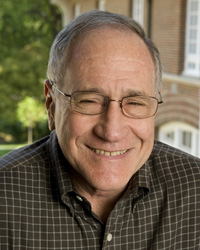Honig honored for his contributions through computational methods
The 91—«…´¥´√Ω has named , professor of biochemistry and molecular biophysics at Columbia University College of Physicians and Surgeons and a Howard Hughes Medical Institute investigator, the winner of the society’s 2012 .

About the award
The DeLano Award for Computational Biosciences was established by family, friends and colleagues to honor the legacy of Warren L. DeLano. The award is given to a scientist for the most accessible and innovative development or application of computer technology to enhance research in the life sciences at the molecular level. The contribution should include two key elements – more productive use of computers to accelerate and facilitate research and ready access of these programs for the scientific community.
The 2011 DeLano Award recipient, Axel Brunger of Stanford University, stated his case in nominating Honig for the award succinctly: “Few computational scientists had as much of an impact as Dr. Honig on the understanding of macromolecular interactions in biology.”
Honig said he was delighted that the society “has chosen to recognize, with the Delano Prize, the increasingly important role of computational research in modern biosciences.” He continued, “I am honored to be a recipient of the award and am thankful to the community of people who were close to Warren DeLano for the vision and initiative that led to the establishment of the award.”
Honig’s work has focused on understanding how proteins take advantage of electrostatics, the positive and negative electric fields on their surface, to fold into three-dimensional structures and bind to other proteins or cell membranes. “Barry Honig has taught many of us, including myself,” said John Kuriyan from the University of California, Berkeley, “to appreciate the way in which the shapes of proteins influence the electric fields generated by the charges within them.”
Based on his studies of protein electrostatics, Honig and his colleagues developed software that has become a mainstay used to analyze protein structures. According to Andrew McCammon, a professor at the University of California, San Diego, “these methods have been used by many hundreds of research groups to assess numerous studies of the activities of biopolymers, resulting in the now-familiar red-to-blue surfaces of proteins and other molecules on the covers and in the pages of scientific magazines worldwide.”
During his education and training, Honig bounced back and forth between the United States and Israel. He did his undergraduate and master’s work in the U.S. before decamping for Israel to obtain his Ph.D. in chemical physics at the Weizmann Institute of Science. He carried out his research at Tel Aviv University. Again crossing the Atlantic, Honig did postdoctoral fellowships at Harvard University and Columbia University before returning to Israel in 1973 to accept a position at the Hebrew University in Jerusalem. After six years, he returned to America, spending two years at the University of Illinois and then moving back in 1981 to Columbia, where he seems finally to have settled. In 2000, he was named a Howard Hughes Medical Institute investigator.
Honig will receive his award during the Experimental Biology 2012 conference in San Diego, where he will deliver an award lecture. The presentation will take place at 8:30 a.m. April 24 in the San Diego Convention Center.
Enjoy reading 91—«…´¥´√Ω Today?
Become a member to receive the print edition four times a year and the digital edition monthly.
Learn moreGet the latest from 91—«…´¥´√Ω Today
Enter your email address, and we’ll send you a weekly email with recent articles, interviews and more.
Latest in People
People highlights or most popular articles

Hidden strengths of an autistic scientist
Navigating the world of scientific research as an autistic scientist comes with unique challenges —microaggressions, communication hurdles and the constant pressure to conform to social norms, postbaccalaureate student Taylor Stolberg writes.

Richard Silverman to speak at 91—«…´¥´√Ω 2025
Richard Silverman and Melissa Moore are the featured speakers at the 91—«…´¥´√Ω annual meeting to be held April 12-15 in Chicago.

Women’s History Month: Educating and inspiring generations
Through early classroom experiences, undergraduate education and advanced research training, women leaders are shaping a more inclusive and supportive scientific community.

91—«…´¥´√Ω honors Lawrence Tabak with public service award
He will deliver prerecorded remarks at the 2025 91—«…´¥´√Ω Annual Meeting in Chicago.

91—«…´¥´√Ω names 2025 JBC/Tabor Award winners
The six awardees are first authors of outstanding papers published in 2024 in the Journal of Biological Chemistry.

Daniel N. Hebert (1962–2024)
Daniel Hebert’s colleagues remember the passionate glycobiologistscientist, caring mentor and kind friend.

